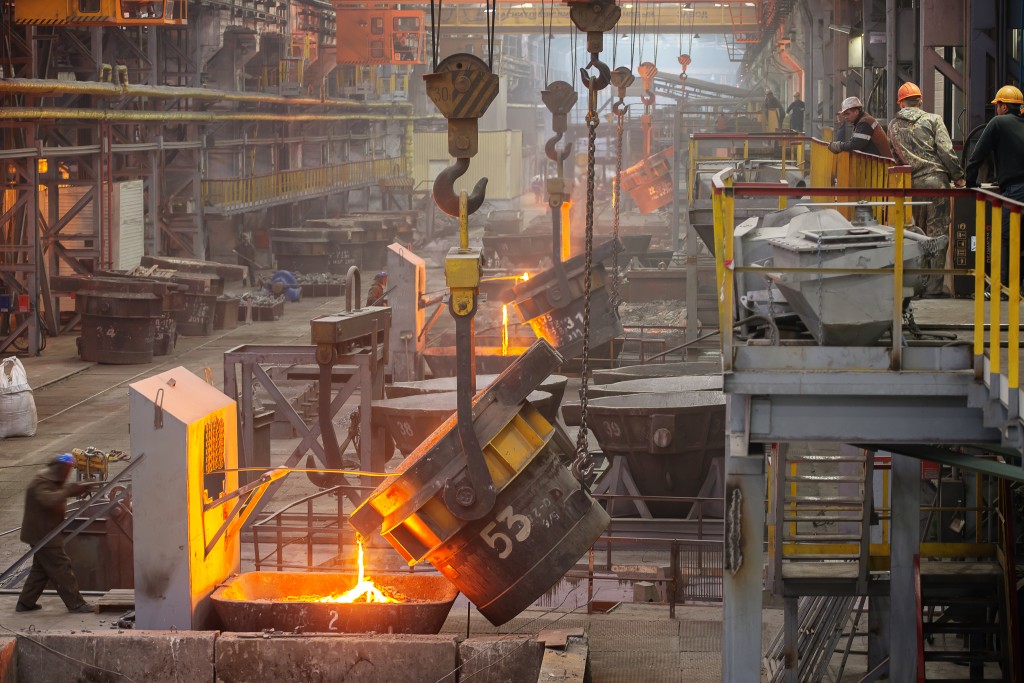Page added on February 25, 2015
How Energy Productive is the United States?

Steel plant. Photo credit: Shutterstock
A new global index commissioned by Philips ranks countries by their energy productivity performance and finds the US in 38th position trailing the likes of Japan (24th) and Germany (17th). The “2015 Energy Productivity and Economic Prosperity Index – How Efficiency Will Drive Growth, Create Jobs and Spread Wellbeing Throughout Society” report – authored by Ecofys, the Lisbon Council, and Quintel Intelligence – sheds light on the tremendous potential of improved energy productivity for “rais[ing] economic performance and extend[ing] significant environmental and social benefits” to societies.  Source: Philips
Source: Philips
According to the report, a staggering 98 per cent of energy is wasted and only “a modest rise in energy productivity will boost the economy, create jobs and contribute to saving the environment.” Various country-specific energy productivity scenarios show, for example, that “overall energy consumption in the EU could [simply] be cut by 35% by doubling the region’s rate of energy productivity improvement from currently roughly 1.6% to 4% per year by 2030.”
However, the report also warns that the current rate of energy productivity improvement is not fast enough to keep up with the projected demographic trends and long-term economic growth patterns, which inevitably will lead to rising energy demand and further resource extraction as well as depletion. In this respect, the problem is not a lack of critical technology, rather “vastly more efficient machinery and energy sources” at mankind’s fingertips are deployed too slowly for a myriad of reasons.
Here are some other interesting findings from the study:
- A doubling of energy productivity could reduce the global fossil fuel bill by more than €2 trillion – at the same time potentially creating more than six million jobs globally by 2020.
- 98 per cent of all energy used during production/manufacturing is not being converted into ‘useful’ services and products but is instead wasted.
- Since size matters with respect to energy consumption, improving further on the already existing levels of energy efficiency in the world’s largest economies will yield significant reductions in energy consumption on a global scale. Interestingly, the report says that the “world’s largest economies were able to produce on average 18% more GDP in the last 10 years thanks to the energy savings they have already made” while during the same period in the EU, “improving energy efficiency helped facilitate an additional 17% of economic growth at the same level of energy consumption.”
- Developing countries in particular have “an inbuilt advantage” because they can benefit from developed countries’ historical experiences, in addition to the availability of new technology that can allow developing nations to “‘leapfrog’ the developed world and move speedily towards cost-saving energy-productivity levels.”
Source: Philips
Remember, energy productivity – i.e. amount of GDP produced for every unit of energy consumed – must be distinguished from energy efficiency, which is simply using less energy to perform the same functions.
Read the entire report for sub-indicators and country-focused scenarios.
6 Comments on "How Energy Productive is the United States?"




Davy on Wed, 25th Feb 2015 9:05 am
This Breaking Bad Article said – However, the report also warns that the current rate of energy productivity improvement is not fast enough to keep up with the projected demographic trends and long-term economic growth patterns, which inevitably will lead to rising energy demand and further resource extraction as well as depletion.
This is great: “In this respect, the problem is not a lack of critical technology, rather “vastly more efficient machinery and energy sources” at mankind’s fingertips are deployed too slowly for a myriad of reasons.”
Please folks tell me which vastly more efficient machinery and energy sources is some villain not allowing the world to deploy. Damn, I forgot Methane hydrates and NUK fusion. I also forgot the shale revolution.
OK, white flag corns you win.
dave thompson on Wed, 25th Feb 2015 9:52 am
The illustration of the earth covered in industry is a great way to show the Orwellian double speak in this one. Less is more in the new world order.
Plantagenet on Wed, 25th Feb 2015 12:33 pm
Its easier for a small densely populated city like Hong Kong or Singapore to be “energy efficient” then a giant sprawling continent-wide nation like the USA. I’m sure if you are looking at energy efficiency, Alaska is much less “energy efficicent’ than Hong Kong. On the other hand, just try to fly in to a remote lake in the Brooks Range to go moose hunting in Hong Kong—it aint’ gonna happen.
hiruitnguyse on Wed, 25th Feb 2015 5:35 pm
Well since;
Energy + Minerals = GDP
and
GDP(products) + Time = Waste,
then I would say ultimately, exactly Zero.
hiruitnguyse on Wed, 25th Feb 2015 5:41 pm
Hey we’re number 29 in this metric also:
15 year old PISA Science Literacy, 2012 scores. Go to page 17;
http://nces.ed.gov/pubs2014/2014024rev.pdf
Makati1 on Wed, 25th Feb 2015 6:30 pm
Waste is the reason there is a worldwide depression and the world is headed into the crapper. Obvious on this chart who big the wasters are. But, that is not news, just obvious.
Had to laugh when I saw the Ps as #6 on the list. I’ve been saying that there is little waste here, but no one seemed to believe me. Yet their 100 million people seem to have a good life, for the most part. Even the poor manage to have fun and raise families that can go on to college, etc. And only a small percentage are chained to the bankster cartel by loans and credit cards.